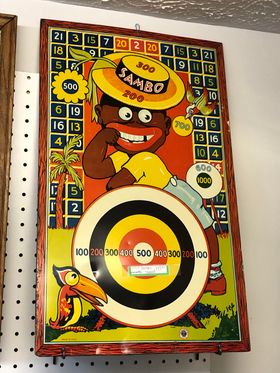Jim Crow Museum
1010 Campus Drive
Big Rapids, MI 49307
[email protected]
(231) 591-5873
 Q: I found this object at an antique shop. I'm sure it comes as no surprise but this
stuff is very common. After reading Dr. Pilgrim's books I have better context to know
the extend these items were mass produced.
Q: I found this object at an antique shop. I'm sure it comes as no surprise but this
stuff is very common. After reading Dr. Pilgrim's books I have better context to know
the extend these items were mass produced.
I am conflicted on what to do, to purchase the item, and to donate it, participates in a market demand tor them. However, to not purchase the item, keeps the opportunity for the item to be presented without context and be normalized-or simply kept in circulation.
I know the museum accepts donations, but do you offer any guidance around the ethics of this?
~Scott W.
Facebook
A: Thank you for the question. There are many reasons why people collect these items and there is no way to determine their motivations and intentions. Some collect for personal reasons and others for profit. There have been many African American collectors who collect and use the items in order to teach their friends and family about the imagery and such, similar to the work of the museum.
We at the museum will always stop short of saying the items should be banned or illegal for sale and we do not encourage people to spend their own money to buy the objects either. However, we do accept donations and hope that collectors and the general public could use us as a resource to put the objects in context.
Sometimes people have a cathartic experience by donating the objects to us and or purchasing the objects and donating them to us and there is not much we can do about that. So all in all, maybe a suggestion to people that sell these types of objects is to ask them if they are familiar with the Jim Crow Museum, then suggest they consider donating some of the objects to the Jim Crow Museum to be used as teaching tools. Our aim is to educate and have conversations about damaging imagery in hopes that people no longer desire to collect these types of vestiges of our past.
Hope this helps.
Franklin Hughes
Jim Crow Museum 2022